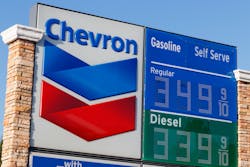Chevron to supply RNG to Walmart for demonstration of Cummins’ engine
Energy firm Chevron has signed a definitive agreement with Walmart to supply renewable natural gas (RNG) for its demonstration of Cummins’ new 15L natural gas engine for heavy-duty trucks. The trucks will be field-tested at Walmart’s distribution center in Fontana, California.
According to the agreement, Walmart will provide the heavy-duty trucks, which will be fitted with Cummins X15N natural gas engines. Chevron will supply the fuel needed to run the engines.
Chevron has partnered with Brightmark and California Bioenergy to produce renewable natural gas from dairy farms. Renewable natural gas is produced when biomethane from decomposing landfill waste or cow manure is captured and treated. The RNG from Brightmark and California Bioenergy qualifies as carbon negative on a lifecycle basis per California’s Low Carbon Fuel Standard.
Puneet Jhawar, General Manager, Natural Gas at Cummins said, “The Cummins X15N natural gas powertrain allows for fleets to significantly reduce their emissions footprint starting almost immediately on a large scale with competitive equipment costs, while providing the power, range, and performance characteristics customers expect from Cummins.”
“Walmart’s collaboration with Chevron and Cummins on the new Cummins 15-liter natural gas engine is one of many technologies we are testing to reach zero emissions in our fleet, part of our broader goal to achieve zero emissions in our operations by 2040,” said Luke McCollum, vice president of Supply Chain Sustainability at Walmart. “Testing CNG linked to renewable natural gas marks a significant stepping stone for Walmart’s path to zero emissions transportation.”
Some other initiatives by Walmart to reduce emissions in transportation are the use of liquid hydrogen for its forklifts and exploring the use of EVs in its fleet, like for its refrigerated trucks. The electric yard trucks Walmart uses at its distribution centers have resulted in a 50% emissions reduction when compared to diesel trucks. Walmart plans to pair these with renewable energy to achieve 100% emissions reduction.
About the Author
EnergyTech Staff
Rod Walton is head of content for EnergyTech.com. He has spent 17 years covering the energy industry as a newspaper and trade journalist.
Walton formerly was energy writer and business editor at the Tulsa World. Later, he spent six years covering the electricity power sector for Pennwell and Clarion Events. He joined Endeavor and EnergyTech in November 2021.
He can be reached at [email protected].
EnergyTech is focused on the mission critical and large-scale energy users and their sustainability and resiliency goals. These include the commercial and industrial sectors, as well as the military, universities, data centers and microgrids.
Many large-scale energy users such as Fortune 500 companies, and mission-critical users such as military bases, universities, healthcare facilities, public safety and data centers, shifting their energy priorities to reach net-zero carbon goals within the coming decades. These include plans for renewable energy power purchase agreements, but also on-site resiliency projects such as microgrids, combined heat and power, rooftop solar, energy storage, digitalization and building efficiency upgrades.
